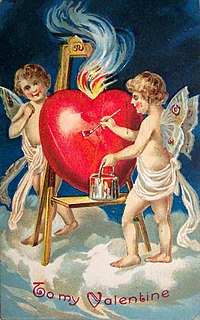 W
WKupala Night,, also called Ivanа-Kupala, is a traditional Slavic holiday that was originally celebrated on the shortest night of the year, which is on 21-22 or 23-24 of June and in Eastern Slavic countries according to traditional Julian calendar on the night between 6 to 7 July. Calendar-wise, it is opposite to the winter holiday Koliada. The celebration relates to the summer solstice when nights are the shortest and includes a number of Slavic rituals.
 W
WThe Day of Saint Peter and Saint Fevronia also known as the Day of Family, Love and Faithfulness, the Orthodox patrons of marriage, was officially introduced in Russia in 2008. Svetlana Medvedeva is among the most active promoters of the new holiday. Its symbol is a white daisy.
 W
WPropose Day is celebrated in India on 8 February as a day to propose to your significant other, a large numbers of young people give roses to propose to their prospective girlfriend or boyfriend. It is second day in Valentines Week. Although Valentine's day is celebrated across whole world, Valentines week is something celebrated in India only. This week marks various festivities across India.
 W
WThe Qixi Festival, also known as the Qiqiao Festival, is a Chinese festival celebrating the annual meeting of the cowherd and weaver girl in mythology. The festival is celebrated on the 7th day of the 7th lunisolar month on the Chinese calendar.
 W
WSadie Hawkins Day is an American folk event and pseudo-holiday originated by Al Capp's classic hillbilly comic strip Li'l Abner (1934–1978). This inspired real-world Sadie Hawkins events, the premise of which is that women ask men for a date or dancing. "Sadie Hawkins Day" was introduced in the comic strip on November 15, 1937; the storyline ran until the beginning of December. The storyline was revisited the following October/November, and inspired a fad on college campuses. By 1939, Life reported that 201 colleges in 188 cities held a Sadie Hawkins Day event.
 W
WTu B'Av is a minor Jewish holiday. In modern-day Israel, it is celebrated as a holiday of love. It has been said to be an auspicious day for weddings.
 W
WValentine's Day, also called Saint Valentine's Day or the Feast of Saint Valentine, is celebrated annually on February 14. It originated as a Christian feast day honoring one or two early Christian martyrs named Saint Valentine and, through later folk traditions, has become a significant cultural, religious, and commercial celebration of romance and love in many regions of the world.
 W
WVasant Panchami, also called is a festival that marks the preparation for the arrival of spring. The festival is celebrated by people in various ways depending upon the region in the life in the Indian subcontinent. Vasant Panchami also marks the start of preparation for Holika and Holi, which take place forty days later. The Vasant Utsava (festival) on Panchami is celebrated forty days before Spring, because any season's transition period is 40 days, and after that, the season comes into full bloom.
 W
WWhite Day is on March 14, one month after Valentine's Day, when people give reciprocal gifts to those who gave them gifts received on Valentine's Day. It began in Japan in 1978; since then, its observance has spread to several other Asian nations.